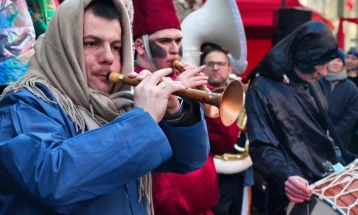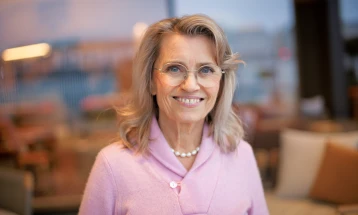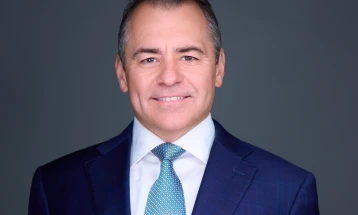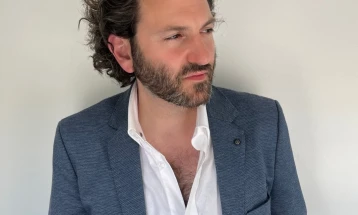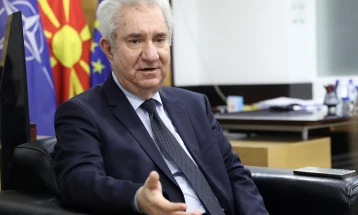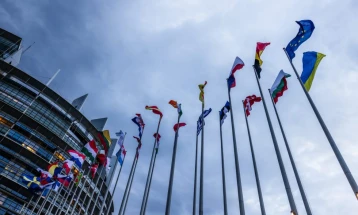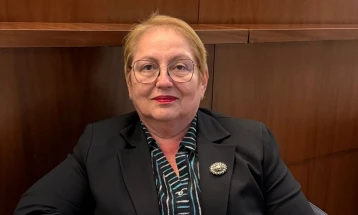North Macedonia at a point where it needs to push door towards brighter future, Aggeler tells MIA
- I truly believe that this country is at a point where it needs to push the door open and it needs to charge through and move forward towards its brighter future, says United States Ambassador Angela Aggeler in an interview with MIA.
- Post By Ivan Kolekevski
- 09:39, 19 May, 2023
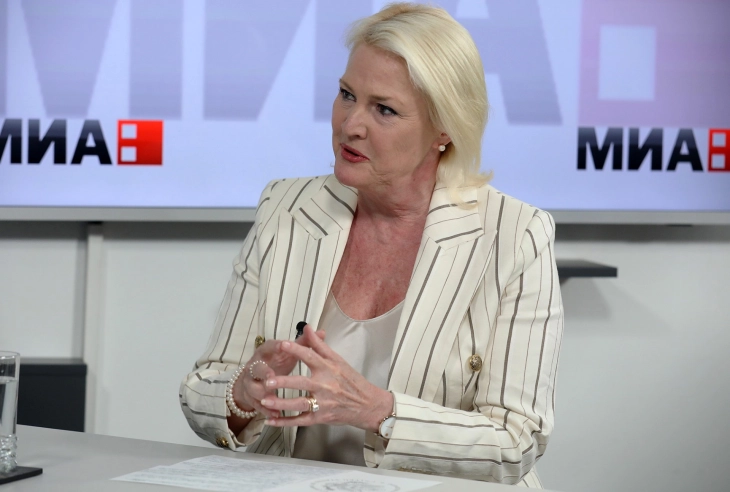
Skopje, 19 May 2023 (MIA) - I truly believe that this country is at a point where it needs to push the door open and it needs to charge through and move forward towards its brighter future, says United States Ambassador Angela Aggeler in an interview with MIA.
Asked about the exit from the political situation in the country, including corruption, non-functional system, divided society, blockade to constitutional changes but also outside influences that aim to block processes, Ambassador Aggeler says she would not use the term exit but entrance.
"I think it’s funny that you use the word 'exit' because I don’t see it as an exit, I see it as a door that’s waiting for this country to push on it and go through, I see it as an entrance I truly do. It’s not a matter, and you know maybe it’s the American optimist within me, but I truly believe that this country is at a point where it needs to push the door open and it needs to charge through and move forward towards its brighter future, and not get caught up in sort of the negative narratives that are coming from within the country and without, and I believe that it can do it," says Aggeler.
The Ambassador also believes that the current geopolitical environment here is also reflected in what it seen beyond the Western Balkans.
"There are geopolitical influences here but they are also global. And especially as, I mean we talked about disinformation, that’s a global reality now. We certainly see it in the United States as well. So the influences are there but there’s also an opportunity I think in recognizing that there are geopolitical forces and how the country and its citizens respond to them. So, for example, with Russia-Ukraine, the response that we have seen from North Macedonia, particularly I’m thinking of the military support, and support to NATO has been outstanding, and in fact has been a model for many far larger countries in Europe, in terms of supporting the efforts there. And so, yes, it’s absolutely a reality, in this country and beyond, and the important thing in my view is to recognize it and then make a choice that works for the people of the country, that is the intelligent way to respond to those geopolitical forces that are in the best interests of the country," says Aggeler.
In the interview, she also refers to the the recent visit of Prime Minister Dimitar Kovachevski to Washington, the letter she sent to the judiciary and the executive, Macedonian-Bulgarian relations, U.S. blacklists, media...
Following is the full interview with United States Ambassador Angela Aggeler:

You recently went to Washington with Prime Minister Kovachevski. There were no journalists with you there but we have lots of information, but maybe not enough information. What did this visit mean for the United States and North Macedonia?
- It was a fantastic visit, it was a very successful visit. The Prime Minister and the Foreign Minister were in New York before going to Washington D.C. I didn’t join them in New York, but the Prime Minister addressed the U.N. Security Council and was the first Prime Minister of North Macedonia to have done so. The following day the Foreign Minister also addressed the Security Council in his role as OSCE Chairperson-in-Office. They then went down to Washington D.C. and had a series of very productive conversations, most importantly, in my view, with the Secretary of State Antony Blinken, a very positive and productive conversation. Also with others within the U.S. government and the Atlantic Council, members of the diaspora community and others. So it was very positive and the main message of this visit was to reinforce – from the Secretary, from the Counselor of the State Department, from the National Security Council – that the United States is here to support North Macedonia in all of its aspirations, particularly towards EU accession, to congratulate this country and its leadership on proving to be such a positive regional force, for collaboration and relationships within the Western Balkans, and to see how we might be most helpful as this country moves towards its very clearly stated goals of Euro-Atlantic integration.
You are coming from the meeting of the inter-party parliamentary group on promotion of the rights of the LGBT community. How was the meeting?
- It was fantastic, it was really great, I was very pleased to have been invited. Today, as you know, is May 17-International Day against Homophobia, Biphobia, and Transphobia. This is a problem not just in North Macedonia, not just in Balkans and Europe, but in the United States as well. We have seen in the last couple of years that the percentage of attacks against LGBTQI individuals globally has increased dramatically. And the important thing today is to reinforce that these are people, these are our neighbors, these are our brothers and sisters, our daughters and sons, our friends. We need to treat these people as valued members of our community, regardless of what their choices are. I really firmly believe and said this morning that a society is judged by how it treats the most vulnerable citizens. There have been improvements and I hope to see more.

I will now take you back 10 years in the past. You were here at the time of Ambassador Reeker. I remember we were working back then on the transformation of the Association of Journalists of Macedonia (ZNM) so you can now make a comparison of the Macedonian media landscape from a decade ago and now.
- I remember very well working with you and some other wonderful colleagues on reforming ZNM and doing really great work. It’s been interesting to me to speak with journalists-friends who were here and who were there before, like you, and one thing that I applaud from 10-12 years ago was the courage and commitment of people like you and other colleagues to bring about those reforms. Today I know there is a great deal of concern about the fact that the number of young people that are applying for journalism school is dropping, that there is enormous pressure on the media. Frankly, this is the case globally. You see this in the United States because the landscapes have changed and the economics of media has changed. So, some of the assumptions that we could have safely made 12 years ago are no longer the same. But there have been a few bright spots in terms of Reporters without Borders still cites concerns, Transparency International has cited an increase and shows North Macedonia as one of the leaders in the region. But there are enormous challenges. I would also suggest that part of the reason that young people are not applying to study journalism here is because many of them are leaving, they are seeking opportunities elsewhere. I hope that the important role that the media plays, through ZNM and other organizations, is to continue to shine the light on truth and what is actually happening within the country and how that affects its citizens. I think there is a great role that continues to be crucially important for organizations like that.

You mentioned the new challenges for media. There is an ongoing OSCE conference focusing on media, the challenges related to disinformation, fake news, developments in the media community. Agencies like MIA are the backbone of that struggle against fake news but the challenges of financial sustainability, predictability, the need for media literary both for media and the public. Is the information that has been recently circulating in Macedonia and the Western Balkans becoming more of a tool for manipulation and propaganda or serves to inform the citizens?
- That is a very important question, As you know, we had our coordinator from the Global Engagement Center who was here recently to specifically talk to leadership and journalists about disinformation and the role of malign actors, as we call them, within the media. We know that Russia plays a malign role in terms of disinformation, misinformation, lack of information, and seeking to negatively affect the environment. What you say, and this is something that we have talked about a number of times, is the importance of media literacy, so that the consumers of this show or whatever they see online, citizens of the country can try to understand what is real and what is not real, and to ask the hard questions. Too often what we see is proxies used by those malign actors who seek to create chaos. They don’t want to have an orderly conversation about facts, they want to sow chaos within the country. A great example of this was the bomb threats that were called in and affected schools around the country. That frightened parents, frightened students and had a negative effect. Our understanding is that sometimes it is very targeted, other times these malign actors are just taking advantage of situation of uncertainty and working to make it worse. We work very closely with media organizations and the government to help try to identify disinformation and what we can do help target it ourselves.
Bulgaria and the whole package of non-goodneighborliness – hate speech, relations between the two societies – simply put as the Bulgarian veto on Macedonia, is this a geopolitical or a problem of historical ambiguities or decades-long aspirations between neighbors?
- In my view, and you know this very well, I am not the Ambassador in Sofia, I am the U.S. Ambassador in Skopje. Actually a good friend of mine is the new Ambassador in Sofia, Ambassador Kenneth Merten, he and I have had a number of conversations about how we can work together to inform those with whom we communicate about the different issues and challenges. But importantly, there is a lot of history between North Macedonia and Bulgaria, that is of course true. There are also those who would be very happy to create additional chaos, those who benefit politically from trying to create narratives about the Macedonian language, the Macedonian identity. The bottom line is that this was an agreement made last summer, in terms of changing the Constitution and it is the next step to move towards EU accession. So those who would take advantage of the points of tension between the two countries are harming both countries in my view, because Bulgaria will benefit as much as North Macedonia from North Macedonia’s accession into the European Union. It will help them in terms of security, it terms of their economy, and in terms of broader regional opportunities and integration.

Let’s move to the lack of functionality of the system and the democratic capacities that place North Macedonia in the group of so-called hybrid regimes. This means corruption, crime, both institutionally and individually. What is your take on this lack of functionality?
- I take issue with the hybrid democracy term, but there are enormous challenges that face this country. I think it’s no secret that I certainly view corruption and crime to be a major challenge that is facing the country right now. The move towards the European Union and the reforms that come with that process I think help address many of these issues. This country has made sacrifices. Since I left 10 years ago, it has made very important and very difficult sacrifices, and it has shown that it can address real issues when it is called upon to do so. I believe that there are those of goodwill in this country who are also tired of corruption. I think everybody is. I haven’t met a single Macedonian who is fine with corruption. It is my very great hope that the people will say ‘enough’ and that they will demand of their institutions that these issues are addressed in a way that it’s open and transparent, and they can hold leaders, businesspeople, others within the society accountable if they are not following the rules.
I have the impression that media are more engaged in detecting corruption and crime and do most of the work rather than the institutions, and this has been ongoing for more than a decade. Even if these cases reach the courts and the prosecutor’s office, the story ends there and cases exceed the statute of limitations. Your view?
- I think this is a very important question and I’ve heard that a lot, journalists saying ‘why is this my job now’. Well, it is your job. Part of the journalists’ work is to ask the hard questions. There are very good investigative journalists in this country. You are one of them, you’ve asked leaders and others very hard questions over the years, and that is the important role of the media. However, it does not substitute for the requirements for those involved in investigating and prosecuting crimes. There is a role for the police, there is a role for prosecutors, there is a role for defense attorneys and there is a role for the judges. Everybody has to do their job for this to work. I think the role of media in this is absolutely critical but that doesn’t replace the need for those within the judiciary who are responsible for prosecuting crimes to do so.

Yes, but people in the media are a bit frustrated by the fact that the story stops and is not followed through. So our thinking is why would politicians give up on their profits, why would they change their modus operandi, since this is the way in which they operate. What would challenge them, I am not sure that event the blacklists compiled by the U.S. State Department is something that would change the way this society functions.
- The short answer, is the blacklist enough – no. It is not because at the end of the day, even if the United States determines that somebody is a corrupt actor, is a corrupt official, is harming democracy or society by their illegal actions, we can call them out but we are not going to go in and arrest them. So we can say ‘We as the United States will not allow you to enter our country anymore and we can impose certain financial and other sanctions. Again, this is something that after the Prime Minister and the Foreign Minister left Washington I had series of meetings also internally, to talk about where we are on some of these sanctions issues. In and of itself, is someone’s name on a blacklist going to change that behavior – not necessarily. But this is again where the role of the citizen of this country, the individual who is tired of seeing people who benefit through illegal structures and illegal activities, is to hold them accountable. Hopefully, we want to assist with that in calling this out, because we have to by law. It is a very specific process but we also hope that the citizens of this country will also demand of their leaders that action also be taken.
The recent letter you sent has shown that not everything is hopeless, since it led to changes in the Judicial Council and there was a lot of talk in the media about this. Nevertheless, we never got to know the letter’s content, was it a direct criticism of the processes or did it include specific names?
- You are the only one in the country who hasn’t seen it because I’ve heard a lot of people who have seen a copy that has been leaked. I felt it very important to send that letter to the Minister of Justice and to copy a number of others in the Government and other foreign ambassadors, because we have, as you know, a number of officers within our embassy who look at justice issues. I have said repeatedly, the United States has provided over a billion dollars in the last 30 years to this country in non-military assistance, including with media projects and activities. Over half of that billion dollars has gone to support rule of law and good governance, including the judiciary. We estimate that over 80 percent of prosecutors and judges in this country have participated in one of our programmes. When we look at that as an investment, it is not a very good return on our investment. We would like to see, if we are to continue to invest in the judicial sectors of this country, we would like to see that it makes a difference and that there is integrity and a system, because again this comes down to the citizens of this country and they deserve a judiciary where they understand the process, they understand what happens, and it’s not just simply a decision is suddenly made that has somebody put into a position for which they are wholly unqualified without any kind of an explanation. It is my hope, and I offered in that letter and in many public conversations that I am happy to do what I can and with the team at the embassy, to talk through some of those processes, so that what we are investing in this country actually helps the people of this country and is not some process where former politicians pick up the phone to try and get a decision on a case that is preferable to them.

We are living in a divided society, where citizens believe in their own truth. Take Bechtel-Enka as an example. For the authorities it is a historical agreement and for the opposition it is the plunder of the century. We are seeing these days the parliamentary sessions on the laws that are required for swift implementation of the project. In this regard, the narrative that the common citizen is seeing is ‘the U.S. ambassador was together on the stage with both Grubi and Kovachevski. It is possible that she is involved in such processes?'
- First of all, this was not a fast process. They have been working on this deal for almost a year-and-a-half now and they have responded by sharing aspects of the contract with many of those within the government. The fact of the matter is, I am American, I don’t vote here, I don’t have a party in North Macedonia, I am not a member of any political party, I am however very pro-American business and we in the Embassy do everything we can to help promote American investment here, because it is not only good for the American investors and the American companies, but it’s very good for the citizens of this country. And everyone I’ve talked to was very excited about having a Bechtel highway in their country. We have only to look at Pristina and the beautiful road they have there. I find it very disappointing that those in the opposition, without frankly all the facts, are criticizing something about which they have no information. They are simply doing it to be against the government. That’s what an opposition does, but at the same time, I am completely confident that the process in which Bechtel was involved has been fully transparent and fully above board because that is how they operate. They wouldn’t have projects all over the world and a number here in the Western Balkans if they weren’t a reliable company. And people of this country will be very happy to have Corridor VIII and Xd when it’s completed. The negotiation is still being resolved but I think it’s unfortunate that there are those who would stand in the way simply to try and make political points.
Let’s move to North Macedonia’s Euro-Atlantic path. The goal alone - North Macedonia joining the EU - is obviously not enough for successful constitutional amendments, at least not for the politicians.
- Well, this goes to my earlier point about the fact that the people of this country have made very tough choices and taken tough decisions to, I mean, you changed the name of your country, and that was something that Dragan if you’d asked me before I’d left if this country would be willing to do that, in 2013, I would not have believed it. And so, people understand that there are difficult decisions that have to be taken. But you’re absolutely right, simply having a goal does not mean you achieve it. It requires action, and it requires in this case yet another constitutional amendment. I know people are tired of that, but at the same time they also want to be in the European Union, because they recognize the enormous benefits of opening those doors to the European Union and to Euro-Atlantic integration. So it isn’t enough just to hope it, it requires yet another tough decision and I really do hope that the leaders of all political parties put aside their differences and act simply in the best interest of the country and its future.

The citizens are tired of the whole story towards the EU, but fears are also real regarding, if I may say so, the messages from Sofia, if I may call it greed, but regarding all that is being demanded of our country... And now, in this process, how real are those fears? People are looking for some kind of a further guarantee that maybe we will not lose everything in that odium on the path towards Europe.
- I think that those who continue with that narrative, yes it is absolutely true that from Sofia and from others we’ve heard very aggressive language that has indicated, frankly that is not fact-based about the situation here in North Macedonia and again I am very lucky to be the U.S. Ambassador to North Macedonia and to be here in Skopje and I’m not in Sofia, but the important thing, and I truly believe this, that the leaders and citizens, not those that are the loudest voices right now but the people of this country recognize and the people of Bulgaria, that, again, the benefits of having a neighbor a very close neighbor that’s also in the European Union, with whom you can enhance your trade, with whom you can work together on security issues, on regional integration and all of these sorts of activities, that’s in the best benefit of this country, and in my view, it’s also in the best interest of Bulgaria and the other neighbors in Western Balkans.
Also on the topic of constitutional changes, we’re aware of the environment, we have reached, of course there is no two-thirds majority, but we are in a situation where some say that it should be done, if it is done, before the elections, others say that constitutional changes should come after the elections or we will see what we will do. How much are early elections the solution to this whole deadlock considering that, as I said just earlier, we have a divided society, we have divided parties, we have “fiery groups”, or I don't know this kind of groups, that kind of groups, third parties, and mistrust of each other... Can early elections resolve all that or we can get stuck, like Bulgaria, unable to form a government, for example.
- Listen I have no idea. It would be speculation. These are definitely internal matters, but can they? One often sees things better from afar. It’s very important when you don’t know the answer to say you don’t know. And I have no idea whether or not this country will go to early elections, I do know that there are those who would like it, to see that happen, I also know that there are many who would like to simply move forward with the scheduled elections for next year. How that plays out I’m not sure. Again I do know that there are those outside of this country and within this country who would like to harm that process of moving forward, and there is a timeline with the European Union and the next review of the IGC, a review that is important and coming up in November, so that’s part of the conversation as well. I’m not convinced that, there are those who say that they are not supportive of the constitutional amendments unless there are early elections and then they’ll support them, I think you’re either in support of doing what’s necessary to move towards the EU or it’s against. And again I’m very hopeful that those in whichever party that care about the future of this country will make the decisions to move forward and take the actions that are necessary to move towards the European Union. Now whether or not that means early elections, whether they happen next spring, I can’t predict, and we’ll just see what happens and believe me, we’re watching very closely.

Given the whole environment, we have roughly reflected on ours, we can call it geopolitical games or a consequence of geopolitical games, due to the fact that the Western Balkans is stuck, so we are trying something with the Open Balkan, and that is also not fully exact... On the other hand, we have the region which is, so to speak, the whole region is in some context of crisis, we have the Russia-Ukraine war... We have the false bomb threats, now we see them in Belgrade again, they will probably reflect again... Is this the same package?
- You know, I think the current geopolitical environment here is also reflected in what we see well beyond the Western Balkans. There are geopolitical influences here but they are also global. And especially as, I mean we talked about disinformation, that’s a global reality now. We certainly see it in the United States as well. So the influences are there but there’s also an opportunity I think in recognizing that there are geopolitical forces and how the country and its citizens respond to them. So, for example, with Russia-Ukraine, the response that we have seen from North Macedonia, particularly I’m thinking of the military support, and support to NATO has been outstanding, and in fact has been a model for many far larger countries in Europe, in terms of supporting the efforts there. And so, yes, it’s absolutely a reality, in this country and beyond, and the important thing in my view is to recognize it and then make a choice that works for the people of the country, that is the intelligent way to respond to those geopolitical forces that are in the best interests of the country.

In closing, how do we find the exit of this whole situation?
- You know, I think it’s funny that you use the word “exit” because I don’t see it as an exit, I see it as a door that’s waiting for this country to push on it and go through, I see it as an entrance I truly do. It’s not a matter, and you know maybe it’s the American optimist within me, but I truly believe that this country is at a point where it needs to push the door open and it needs to charge through and move forward towards its brighter future, and not get caught up in sort of the negative narratives that are coming from within the country and without, and I believe that it can do it.
Dragan Antonovski
Photo: Darko Popov
Video and editing: Asllan Vishko and Andrej Brankovikj
Translation: Ivan Kolekjevski and Nevenka Nikolikj
